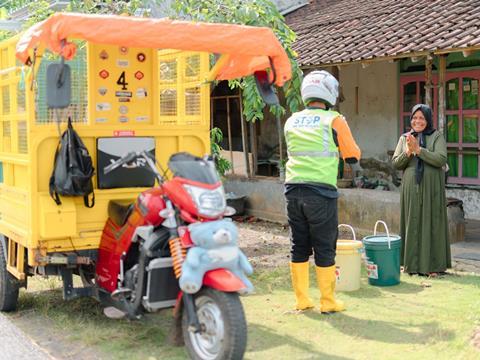
Project STOP, an Indonesia-based circular waste management scheme run by Borealis and Systemiq, has welcomed Clean Rivers as its latest partner.
Clean Rivers, a global non-profit organization that is working to reduce pollution in waterways, joins forces with Project STOP to establish Indonesia’s first Regency-wide waste management system in the Banyuwangi Regency, East Java, Indonesia. In Indonesia, a regency is a second-tier subdivision that sits below the provincial level.
Project STOP collaborates with the Indonesian national government, local government and municipalities in a bid to develop and implement effective circular waste management systems and waste management services for households.
In addition to its expansion to Regency-level, the program hopes to drive a transformation of Indonesia’s waste management system through plastic reduction and reuse initiatives, engaging policymakers to develop innovative waste management policies, exploring diverse financing models and leveraging technology advancements, all underpinned by training and capacity building.
The partners believe that working at this larger scale will create a roadmap and an enabling environment for reaching Indonesia’s government targets, which aim for a 70% handling rate of all waste and a 30% reduction of waste at source through ‘reduce, reuse, recycle’, and ensuring that all Indonesians have access to circular waste management.
The partnership with Clean Rivers comes on the heels of the inauguration of a large-scale materials recovery facility (MRF) in September 2023 and the construction of a second MRF to commence later in 2025.
The partners say that Clean Rivers’ funding will enable Project STOP to expand, providing up to 850,000 people with access to the new MRFs and an affordable, end-to-end waste management system while creating up to 1,000 full-time jobs.
Ultimately, Project STOP aims to provide a blueprint model for further replication across Indonesia.
Clean Rivers hopes that Project STOP Banyuwangi Phase 3 will be a pivotal project within the framework of a Memorandum of Understanding (MoU) recently signed by the UAE’s Ministry of Climate Change and Environment, and the Republic of Indonesia’s Ministry of Maritime Affairs and Investment.
This initiative seeks to build on ongoing cooperation between the two countries on other sustainability-focused projects, such as the Mangrove Alliance for Climate, and the Mohamed bin Zayed-Joko Widodo International Mangrove Research Center. Clean Rivers’ contributions form part of the UAE’s $20 million commitment to Indonesia for waste management and clean-up projects.
If you liked this story, you might also enjoy:
Reuse vs. single use – which is better for the environment?
Sustainable Innovation Report 2025: Current trends and future priorities
What can the world learn from South Korea’s world-leading performance in plastics circularity?














No comments yet